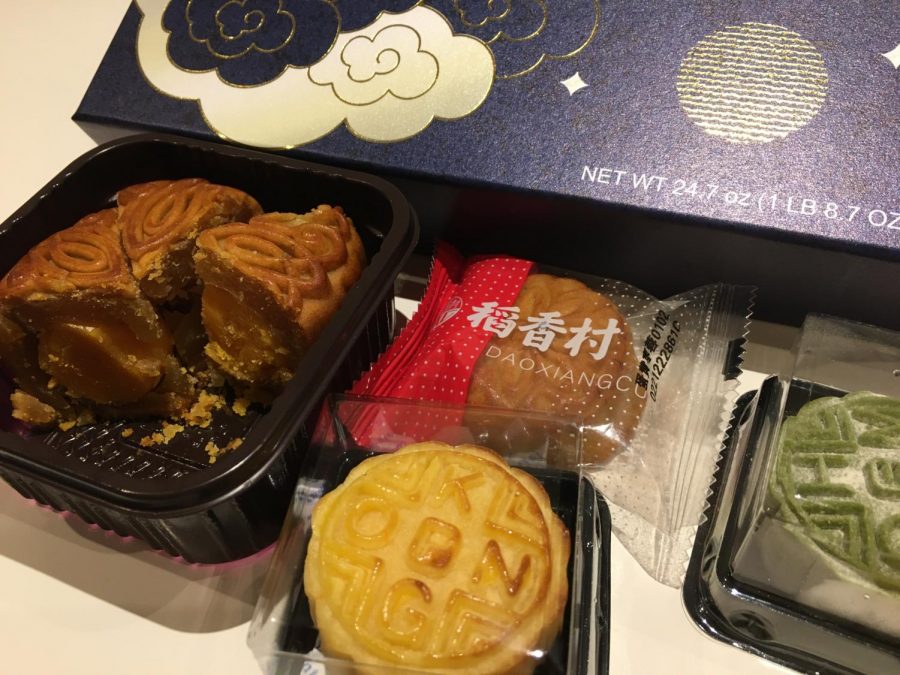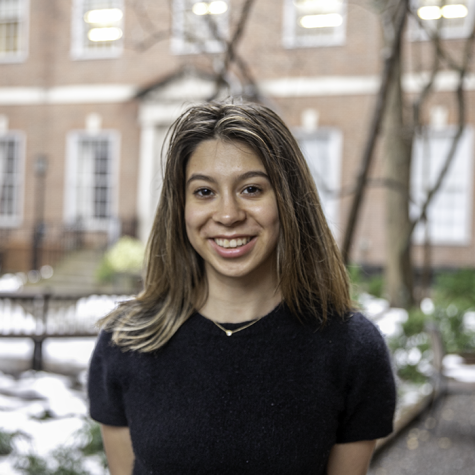More than a mooncake: Students celebrate Mid-Autumn Festival with beloved dessert
The Mid-Autumn Festival is an important holiday in Asian cultures that honors family and reunion. Here’s how NYU students celebrate the festival while away from family and share its traditions with their peers.
Mooncakes are a dessert that are eaten in some countries to celebrate the Mid-Autumn festival. The festival, which begins tomorrow, is an important holiday in Asian cultures that honors unity and family. (Staff Photo by Alexandra Chan)
September 20, 2021
Tomorrow, Sept. 21, marks the start of the Mid-Autumn Festival, a holiday honoring unity and family widely celebrated by many communities in Eastern Asia. Different countries practice different traditions, but many celebrate the festival through food — particularly mooncakes, an Asian dessert with a sweet or savory filling encased in a thick pastry and pressed in a delicate mold. The cakes are roughly the size of your palm, and the fillings — which range from sweet lotus seed paste to chopped pork with salted egg yolk — vary from country to country.
As someone with an appreciation for food, just writing the description makes me eager to eat the special dessert. But I want to make it clear that there is more to this festival than mooncakes. I am not an expert on this holiday by any means, but I am fortunate to have learned about it from my friends Alison Chen and Brian Li.
Li, a Stern senior, explained to me that the mooncake is a symbolic component of the holiday because of the cake’s ties to the moon.
“The moon is very important in Chinese culture because they used to run on the lunar calendar for planting and crops,” Li said.
There are a few stories detailing the festival’s origins, with each story varying from country to country. Li told me the legend of Hou Yi and Chang’e, one of the more popular stories told in China to explain its origins, and added that nowadays the values of family and unity are an important part of the holiday.
“You’re celebrating the unification of a family, coming together and sharing,” Li said. “That’s why you share mooncakes.”
The essence of family is embedded in the mooncake’s design. Chen, a Tandon senior, told me that the cakes are often pressed in molds, which contain words or a design, that are passed down from generation to generation. However, according to Li, not many families make them any more.
“It’s really hard to make unless you have the mold and some flavors you can’t buy year round,” said Chen.
Chen grew up in a Taiwanese family in the Bay Area, so celebrating the Mid-Autumn Festival was a ritual part of her childhood.
“My mom would buy different mooncakes of different sizes and as a kid I hated the ones with the egg yolks in it, but [when I got older] I realized that was the best one,” Chen said.
Chen decided to continue her family tradition in college after her mom sent her a package containing mooncakes.
“During my second year, my mom didn’t send anything, but my friend Steve and I went to Chinatown to grab mooncakes,” Chen said. “We have to keep up with tradition.”
Luckily, it was Chen’s determination to honor her roots that led me to learn more about the Mid-Autumn Festival. Chen and her friend Steve brought back a mooncake for a group of my friends and I to share. I will never forget my first taste. The density and subtle sweetness of the lotus seed paste made for a memorable bite that I would come to crave.
“It’s good food, and you never pass on a chance to have good food,” Chen said.
Both Li and Chen have celebrated the Mid-Autumn Festival with friends in the past. Even during COVID-19, they were able to safely gather and spend the holiday with roommates. They plan to continue the tradition this year by exploring Chinatown, finding a bakery that sells mooncakes and then sharing them with friends. Lucky me.
Students interested in learning more about the holiday can attend a series of festivals taking place throughout the week that aim to teach New Yorkers about the holiday through cultural events and foods like the mooncake.
A version of this piece appeared in the Monday, Sept. 20, 2021, e-print edition. Contact Gabby Lozano at [email protected].

























































































































































